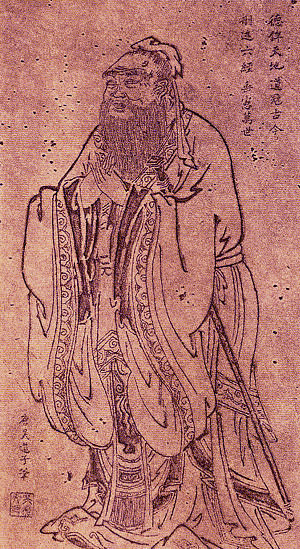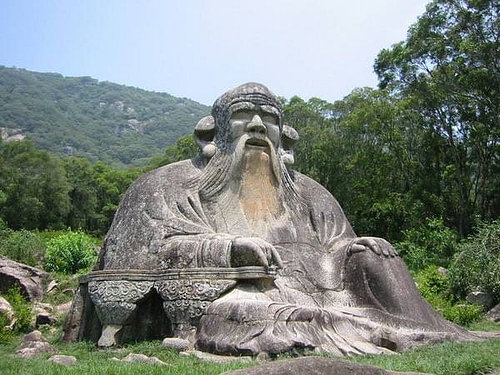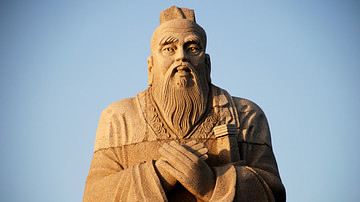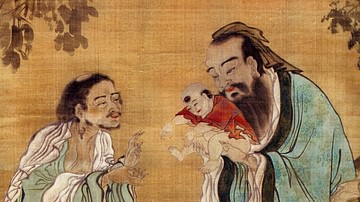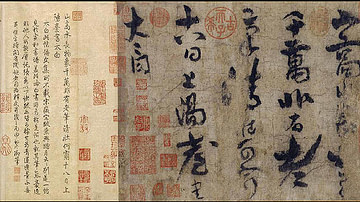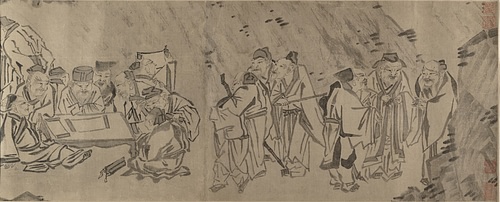
Teng Shih (l. c. 500 BCE) was a Chinese Sophist and lawyer who lived and wrote in the province of Cheng (Pengcheng, modern-day Xuzhou, Jiangsu province) during the era of the Spring and Autumn Period (c. 772-476 BCE) which preceded the Warring States Period (c. 481-221 BCE) in China.
He is associated with the informal school of Relativism which maintained that any declaration of 'truth' was relative to the individual and is best known for teaching 'the doctrines of the relativity of right and wrong'. He is also famous for his persistent opposition to the government of Tse-Tsan (d. 522 BCE), the magistrate of Cheng who disapproved of his philosophy, and his clever methods of expressing his dissent.
The period in which he lived was a chaotic time during which the waning power of the Zhou Dynasty (1046-256 BCE) resulted in seven states – which had already absorbed many other smaller ones – fighting each other for control of China. This period gave rise to the Hundred Schools of Thought, a figurative phrase referencing many different schools of Chinese philosophy established at this time, largely, in response to the disorder and instability caused by the wars. Among the many, 14 were considered most notable by later Chinese historians:
- Confucianism
- Taoism
- Legalism
- Mohism
- School of Names
- Yin-Yang School
- School of Minor Talks
- School of Diplomacy
- Agriculturalism
- Syncretism
- Yangism (Hedonist School)
- Relativism
- School of the Military
- School of Medicine
Some of these, such as Confucianism and Mohism, were formal schools but many, such as Teng Shih's, were not; they were, rather 'schools of thought' promoted by a founder and a few followers. Teng Shih may have influenced The School of Names, established in the 3rd century BCE (also known as the School of the Logicians), but was definitely associated with the school of Relativism.
This philosophy was considered subversive by Tse-Tsan (about whom almost nothing else is known) who, after repeated conflicts with Teng Shih, had him executed shortly before his own death in 522 BCE (though this may have occurred under Tse-Tsan's successor). Teng Shih's works were largely destroyed by the Qin Dynasty (221-206 BCE) which rose to power at the conclusion of the Warring States Period. His philosophy, and the few details of his life still extant, were preserved in Confucian works which were hostile to him. In the present day, he is most often referenced as a Chinese counterpart to the Greek relativist Protagoras of Abdera (l. 485-415 BCE) with whom his philosophy accords closely.
The Hundred Schools of Thought & Relativism
The Zhou Dynasty had been a decentralized state which established a vast territory by allowing lords, loyal to the king, to found their own separate, and almost autonomous, kingdoms, which paid taxes and supplied armies to the king. Although this policy worked well at first, and the Zhou prospered at every level, in time the kingdoms grew to form their own states which became more powerful than the king. Around 771 BCE, the Zhou were forced to move their capital east in response to barbarian invasions from the west, and this begins the era known as the Eastern Zhou Period (c. 772-256 BCE), which corresponds to the Spring and Autumn Period and the Warring States Period when the seven separate states which had now absorbed the many weaker ones fought amongst themselves for supremacy.
The Zhou were too weak to do anything about the conflict and, as its authority weakened, so did the bureaucratic administration it had established. Scholars, teachers, and philosophers who were previously employed by the state lost their positions and so founded their own schools to develop their own philosophies. This movement is known as the Hundred Schools of Thought (meaning “many”, not a literal count of 100), which produced some of the most influential philosophies in Chinese and world history.
Although it is unknown how Teng Shih's relativism developed, it was most likely in response to the many different solutions being proposed by these schools in rectifying the conflict of the era. Each school claimed to have the best solution to reforming government policy, helping the lower classes, ending the wars, and establishing peace and, at the same time, discredited the others in elevating their own. The solutions offered by each of the schools were self-evidently true to them while simultaneously seen as lacking by the others.
In this climate, the conclusion that no claim to truth could be objectively proven, and that any 'truth' was only 'true' to the claimant of that truth, would be a rational response. Teng Shih would have agreed with Protagoras' famous statement usually paraphrased as “a man is the measure of all things” meaning truth is relative to each individual. Without an objective standard of truth on which all can agree, any claim to truth – especially regarding philosophical matters - must be subjective.
Conflict with Confucianism
Little is known of Teng Shih's life other than that he was a successful lawyer, and the meager sources available on him are mostly hostile. He seems, however, to have been an ardent advocate for peasants' rights, and this alone would have made him unpopular with the later Confucian writers, who largely came from the elite, landowning class. At the same time, none of them would have needed to have been of the upper class to condemn Teng Shih's thought as it stood in direct opposition to Confucian precepts.
Confucianism held that people were essentially good and only needed education and proper social structure to encourage them to behave well. Through proper ritual, guidance, and good role models, people would learn to control and govern themselves and this would result in a stable society and a just government comprised of a king, nobles, and officials who held to the same ideals as their subjects.
Teng Shih rejected Confucian principles as idealistic and unrealistic nonsense. People were not essentially good, he claimed, and government was not good either. Further, government was unnatural and could in no way produce good people because 'good' did not exist in nature and, since nothing can come of nothing, any 'good' defined by the government would be a falsehood generated to control the people and serve the government's self-interest. Among the few fragments of Teng Shih extant is the following piece in which he condemns both natural and man-made law for the troubles of humanity:
Nature is not kind to man. Government is not kind to the people. Nature is unable to withhold plague and pestilence and preserve those who die therefrom; nor does it always give longevity to those who do good. Therefore, I say nature is unkind to men. The people who commit burglary and practice fraud and deceit are compelled to do so by poverty and destitution. They are nevertheless ruthlessly punished by the government in accordance with the law. Therefore, I say governments are unkind to the people. (Hu Shih, 13)
Government institutes the laws and creates the inequitable society which results in the poverty of the people, Teng Shih claimed, and then punishes the people for trying to survive under said laws created by a corrupt government for its own self-interests. The laws, then, should be amended so that all people could live comfortably instead of only the wealthy elite.
In this, Teng Shih was in agreement with Confucianism. Many of the philosophies of the Hundred Schools of Thought directed their attention and energy to the reformation of government and the plight of the lower classes. Besides Confucianism and Teng Shih's Relativism, Taoism, Mohism, the Yin-Yang School, Syncretism, and Yangism (the school of the hedonist Yang Zhu, l. 440-360 BCE), all were interested in elevating the quality of life of the peasantry and reforming the immorality and ineptitude of government (Yang Zhu only at first; he later gave up and devoted himself to hedonism). Although all these schools would have rejected Teng Shih's relativism, they would have agreed, more or less, on his views of government and the need for reform.
Teng Shih's War with Government
Teng Shih's criticism of government mirrored one of the better-known concepts of the philosopher and legendary founder of Taoism, Lao-Tzu (l. c. 500 BCE) usually expressed in paraphrase as, “The more rules one makes, the more criminals one creates.” It was clear to Teng Shih that the government conceived of and imposed laws on the people which did not benefit the people at all but only punished them for infractions of governmental policy which were not 'laws' until it served the government's interests to make them laws.
In protest, and in hopes of enlightening his fellow citizens, Teng Shih wrote a series of pamphlets addressing this issue and others concerning what he saw as social injustice. When the magistrate Tse-Tsan tried to stop him by passing a law that prohibited the hanging of pamphlets in public, Teng Shih hand-delivered them to the people. Tse-Tsan then prohibited the distribution of pamphlets by hand and so Teng Shih smuggled the pamphlets to people inside other objects so that the pamphlets were not touching his hands.
The Book of Lieh-Tze, a source favorable to Teng Shih, claims, “The government ordinances were inexhaustible, but his devices to evade them were equally inexhaustible” (Hu Shih, 12). As soon as Tse-Tsan passed a decree to stop Teng Shih's efforts, Teng Shih found a way around it and continued on as he had. He was especially suited to these kinds of manipulations as he had a background in law and was well-known as an effective litigator.
Law Career & Relativism
Teng Shih was a popular and high-priced lawyer who seems to have won far more cases than he ever lost. Claiming there was no absolute 'right' or 'wrong', Teng Shih advocated a relativism which was extremely effective in presenting his cases. According to The Lu-Sze-Chun-Chiu, one of the historical records hostile to Teng Shih:
He could argue a right to be wrong, and a wrong to be right. With him right and wrong had no fixed standard and 'yea' and 'nay' changed every day. What he wished to win was always won; and whom he desired to punish was always punished. (Hu Shih, 13)
Although he seems to have been quite well off, and charged high fees, he also helped those of the lower class by teaching them how to manipulate the court system. He taught the people to advocate for themselves in court instead of paying solicitors who charged them according to the importance of their suit. Sources differ on whether his fees were more or less exorbitant than those charged by the lawyers of the day depending on the regard, or lack of it, of later writers but all seem in agreement that Teng Shih made a comfortable living from his efforts while also assisting the poorer members of society and aggravating those of the upper classes. His ability to argue and manipulate effectively is illustrated in an anecdote from The Lu-Sze-Chun-Chiu:
A wealthy man of Teng's native state was drowned in the Wei River and his body was taken up by a man who demanded of the bereaved family a large sum of money for its redemption. The dead man's family sought Teng's counsel. 'Wait,' said the Sophist, 'no other family will pay for the body.' The advice was followed, and the man who held the corpse became anxious and also came to Teng Shih for advice. The Sophist gave the same counsel: 'Wait; nowhere else can they obtain the body'. (Hu Shih, 14)
It is because of his enthusiasm for arguing any point, without regard to accepted standards of 'right' and 'wrong', that Teng Shih was apparently able to win every case he took on. Whether the story of the drowned man is true is not as important as what it says about Teng's reputation as an unscrupulous manipulator among his detractors and a wise man to his admirers. Poor people then, as now, stood little chance when pitted against the wealthy in courts of law and Teng's manipulation of the situation with the drowned man would have seemed admirable to the one class and reprehensible to the other.
Death & Influence
Teng Shih's opposition to the government was matched by the government's relentless persecution of him. His ability to draw people to him and his great influence over them finally became intolerable to the court of Tse-Tsan, and Teng was executed by beheading either shortly before 522 or in 502 BCE. Tse-Tsan is known to have died in 522 BCE and the discrepancy in Teng Shih's death date is due to conflicting accounts as to whether it was Tse-Tsan who ordered his execution or Tse-Tsan's successor. After his death, the state adopted and instituted his penal code as law.
Teng Shih's work is thought by some to have influenced Lao-Tzu's philosophy and there is certainly much in his underlying attitude, especially regarding equality of all people, which is found in the Tao-Te-Ching, attributed to Lao-Tzu. However, since there is no definite date available for Lao-Tzu's life (and some doubt whether he even existed) this claim cannot be substantiated.
He may have also influenced the logicians Hui Shih (l. c. 380 - c. 305 BCE) and Kung-sun Lung (b. c. 380 BCE), the founders of the School of Names which focused on the correlation between a word and what it represented. This school would eventually produce some of the most interesting logical paradoxes in history through the manipulation of words and the concepts they represent. There are certain clever arguments advanced by later members of this school which seem reminiscent of Teng Shih's style.
Conclusion
The Warring States Period ended with the victory of the state of Qin over the others and the establishment of the Qin Dynasty which adopted the philosophy of Legalism as its official policy. Legalism maintained that people were motivated solely by self-interest and therefore strict laws were required to curb their impulses and maintain social order; this, obviously, encouraged a repressive regime.
Around 213 BCE, the Qin implemented a policy of repression in response to criticism of the government by Confucian scholars. All philosophies except for Legalism were outlawed and their books burned. Those which survived were the ones hidden by people who risked their lives to do so since anyone caught with a proscribed work was executed. Teng Shih's works would have been burned at this time along with many others.
The Han Dynasty (202 BCE - 220 CE), which succeeded the Qin, revived the Zhou Dynasty culture and allowed for freedom of thought and expression, bringing the books which had survived the purge back to light. Under the emperor Wu the Great (r. 141-87 CE), Confucianism was made the state philosophy and Confucian works were copied and disseminated. It is largely from these works that Teng Shih's life and thought are known. He remains today as enigmatic a figure as he seems to have been in life, one which was characterized by his clear identification with, and advocacy for, the peasant class of China; though it is equally clear he had no intention of living as one of them.
